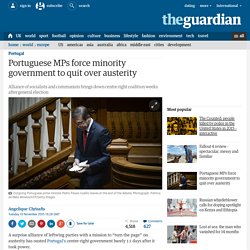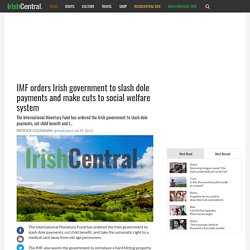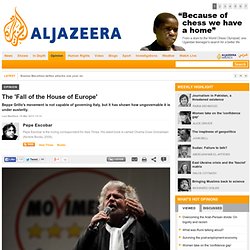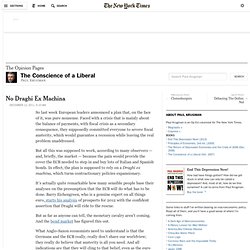

The policy of the ruling elite. Europe in crisis. Insights from the History. EU-Spain. EU-Greece. EU-Germany. RecklessAusterity. European Elections 2014. Finanzkrisen-Prophet Max Otte: "Europäische Union befindet sich wie einst die DDR im Endstadium" — RT Deutsch. Der Ökonom Max Otte gehört zu den wenigen Börsenanalysten, die den Finanzcrash von 2008 vorausgesagt hatten.

Mit der Wirtschaftswoche sprach er über aktuelle Entwicklungen. Hoffnungen setzt Otte dabei auf Donald Trump, für Europa sieht er schwarz. Im eigentlich erfolgreichen Börsenjahr 2006 sorgte der deutsch-amerikanische Ökonom und Fondsmanager Max Otte für Aufsehen. Er veröffentlichte ein Buch mit dem Titel "Der Crash kommt" und sollte zwei Jahre später durch den Ausbruch der globalen Finanzkrise bestätigt werden. Seit dieser Zeit gilt er in der Finanzwelt als Analyst mit dem "sechsten Sinn" und seinen Einschätzungen wird ein hohes Maß an Bedeutung beigemessen, insbesondere wenn es um das frühzeitige Erkennen krisenhafter Entwicklungen geht. Jüngst hat die Wirtschaftswoche mit Otte gesprochen und ihn nach seinen Gedanken zur weltpolitischen Lage und zum Börsenumfeld am Ende des turbulenten Jahres 2016 befragt. Ich war nach der Wahl Trumps riesig erleichtert. Sozialismus: Frankreichs Heimniederlage.
Myriam El Khomri und Emmanuel Macron.

Portuguese MPs force minority government to quit over austerity. A surprise alliance of leftwing parties with a mission to “turn the page” on austerity has ousted Portugal’s centre-right government barely 11 days after it took power.

The moderate centre-left Socialist party forged an unprecedented alliance with the smaller Communist party and the radical Left Bloc, linked to Greece’s anti-austerity Syriza party, and used a parliamentary vote on policy to force the government to resign on Tuesday. The Socialist leader, António Costa, 54, is now expected to become prime minister in the coming weeks with a broad, leftwing coalition government, which hopes to ease austerity while still adhering to European Union rules. The Snowden files: why the British public should be worried about GCHQ. Corporate power has turned Britain into a corrupt state. If you're under attack, create a diversion.

David Cameron and Nick Clegg have been floundering as the spectre of Westminster sleaze has returned to haunt them. Four years after the MPs' expenses scandal engulfed British politics, yet another alleged scam has been exposed. First a Tory MP and then a clutch of greedy peers were caught on camera apparently agreeing to take cash from journalists posing as representatives of foreign companies.
Europe's rescue fiasco leaves Italy defenceless. Collapse of the Celtic Tiger. Filmmaker: Sinead O'Shea Ireland has been one of the largest casualties in the global financial crisis, which began during the banking collapse of 2008 and has continued to impact markets and destabilise the developed world ever since.

Following a government guarantee to underwrite the country’s six major banks shortly after the crisis broke, Ireland’s population of 4.5 million was shouldered with an enormous debt of €400bn ($515bn), proportionately the highest per capita commitment in the world. Yet with bank liabilities accounting for an eye watering 309 per cent of GDP, it quickly became apparent that Ireland would fail to find its own way out of the economic downturn. Scandal of Europe's 11 Million Empty Homes. More than 11m homes lie empty across Europe – enough to house all of the continent's homeless twice over – according to figures collated by the Guardian from across the EU.

This is happening not only in Europe The United States is suffering from the same situation, and numbers are higher, around 18,600,000 Homes are empty. In Spain more than 3.4m homes lie vacant, in excess of 2m homes are empty in each of France and Italy, 1.8m in Germany and more than 700,000 in the UK. There are also a large numbers of vacant homes in Ireland, Greece, Portugal and several other countries, according to information collated by the Guardian. IMF orders Irish government to slash dole payments and make cuts to social welfare system. The International Monetary Fund has ordered the Irish government to slash dole payments, cut child benefit, and take the automatic right to a medical card away from old age pensioners.

The IMF also wants the government to introduce a hard hitting property tax as it seeks a return on its investment in Ireland. The proposals have come from the IMF in a hard hitting directive ahead of the government’s December budget. The IMF is currently bank rolling Ireland’s economic bail-out along with the European Union and their latest orders have been met with harsh criticism from opposition groups and trade unions.
IMF bosses, in Dublin for their regular review of the Irish economy, ordered the Government to cut high social welfare benefits to encourage people back to work. They warned: “Dole payments are high by international standards and responsible for low exit rates from the Live Register. The 'Fall of the House of Europe' - Opinion. The Enchanters came / Cold and old,Making day gray / And the age of goldPassed away, / For men fellUnder their spell, / Were doomed to gloom.Joy fled, / There came instead,Grief, unbelief, / Lies, sighs,Lust, mistrust, / Guile, bile,Hearts grew unkind, / Minds blind,Glum and numb, / Without hope or scope.There was hate between states,A life of strife, / Gaols and wails,Don'ts, won'ts, / Chants, shants,No face with grace, / None glad, all sad.

. - WH Auden, The Golden Age We have, unfortunately, no post-modern version of Dante guided by Virgil to tell a startled world what is really happening in Europe in the wake of the recent Italian general election. On the surface, Italians voted an overwhelming "no": against austerity (imposed the German way), against more taxes, against budget cuts in theory designed to save the euro. Kosten des Sparens. Gastbeitrag: Zeit für die Zentralbank. 28.

Oktober 2011. No Draghi Ex Machina. So last week European leaders announced a plan that, on the face of it, was pure nonsense.

Faced with a crisis that is mainly about the balance of payments, with fiscal crisis as a secondary consequence, they supposedly committed everyone to severe fiscal austerity, which would guarantee a recession while leaving the real problem unaddressed. Estonian Rhapsody. Icelands recovery. Picture credit: may15internationalorganization.blogspot. Who Stole Ireland's Pot of Gold. Banking crises come and go, but they become exceptionally complicated matters when the affected country is non-sovereign in the sense that it does not issue its own currency. This is essentially the problem faced by Ireland, which was the first Eurozone nation to experience a fallout from the Great Financial Crisis of 2008.
To take a step back: Eurozone countries have faced two types of problems by entering the Euro regime. "Islands Häresie stellt einen Test der ökonomischen Doktrin da" "Islands Häresie stellt einen Test der ökonomischen Doktrin da" Christoph Mann 31.01.2012. The Path Not Taken. A tale of two economies – Greece and Iceland. Last Friday (March 9, 2012), the Greek government effectively defaulted on its public debt after the required minimum of 75 per cent of private creditors agreed to the so-called “haircut” or debt swap. I find it amusing how the Euro leaders have attempted to massage the default as a debt swap or some other euphemism. The facts are obvious – close to 100 per cent of those who are holding Greek government debt will lose at a minimum 53.5 per cent of the value of their assets.
This was forced on the private sector by the Troika (EU, ECB, and IMF) who apparently think it is preferable to undermine private sector wealth than introduce changes to their the Eurozone monetary system which might actually make it work! Top Economists: Iceland Did It Right And Everyone Else Is Doing It Wrong. Politiklabor Island - Eine Verfassung wie Wikipedia - Politik. Demokratie statt Fiskalpakt. ESM und Fiskalvertrag: Merkel und Schäuble unterschreiben grundgesetzwidrige Verträge. Herr Präsident! Meine Damen und Herren! Neun-mal NEIN zum Fiskalpakt Seit dem Ausbruch der Eurokrise mit der drohenden Zahlungsunfähigkeit Griechenlands sind nun mehr als zwei Jahre vergangen. Seit dem ist das durch Deutschland dominierte Krisenmanagement durch zögern, halbherzige Bekenntnisse zum Euro und der Europäischen Union, immer neue Krisengipfel und neue Rettungspakete geprägt. Dadurch wurde die Krise aber nicht überwunden, sondern nur das Zusammenbrechen des Euros hinausgezögert.